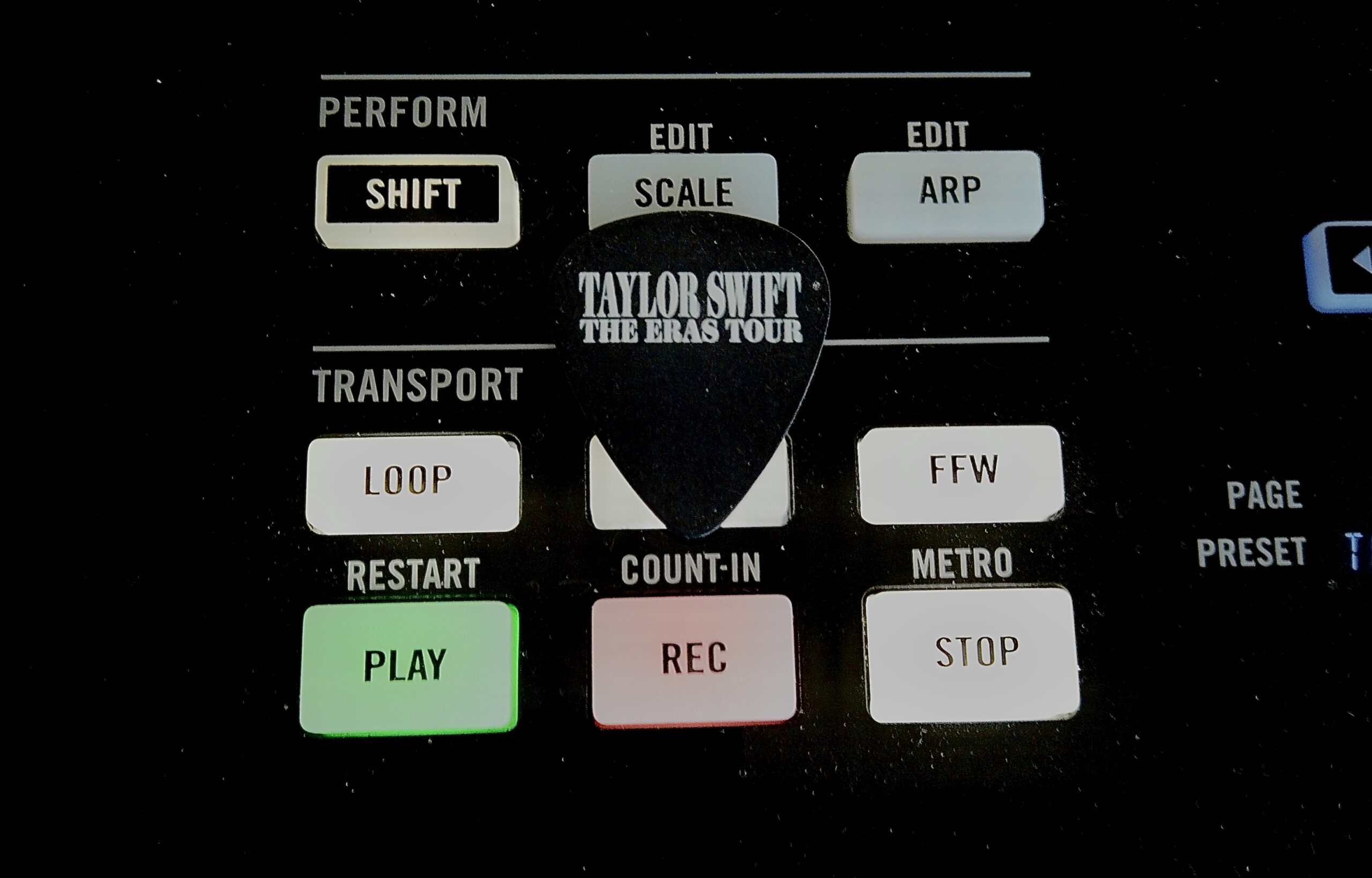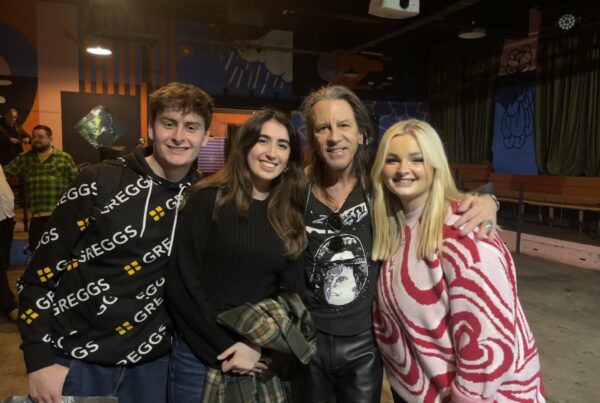By Abi Shaw, Music Production
Introduction
As the music industry evolves, the knowledge surrounding artist rights management and the complications of contracts and record deals are becoming more public to those outside of the inner workings and this is beginning to shed light on some truthful unpleasantries within the supposed glamourous music industry. In an age of social media, where public figures have platforms to speak their thoughts and opinions on matters of the world, as well as the ability to have a positive or negative influence of those who engage with their work – when Taylor Swift made the choice to publicise the business and contractual matters surrounding her masters dispute, there was no doubt that it was going to dominate all headlines and have an impact on the industry, but to what extent was yet to be determined.
Chapter 1 – Who is Taylor Swift? A brief introduction to the female dominating the music industry.
Born in Reading, Pennsylvania in 1989, the American singer-songwriter began her journey in the music industry before she’d even finished high school, with her relocating to Nashville, Tennessee to pursue her career in country music when she was 14. This pushed her towards signing a songwriting deal with Sony/ATV music publishing in 2004, and later signing a 13- year-long recording contract with Big Machine Records in 2005 after being spotted in a local café by founder Scott Borchetta (Taylor Swift Wiki, n.d.). From signing her recording deal with Big Machine Records, it seemed to be onwards and upwards for Swift in regard to the success of her career. In 2006, not even a year after joining BMR, Swift released her self-titled debut album, a country record that debuted at number 1 on Billboard’s Top Country albums, and number 5 on the overall billboard 200; further going on to sell 39,000 copies in its first week. Other accomplishments achieved after the release of this album included staying at the top of the charts for 24 out of 91 weeks, including 8 consecutive weeks (Taylor Swift Wiki, n.d.). After this kickstart to her career, Swift’s progress towards becoming a household name continues to grow with her releasing her sophomore album ‘Fearless’ in 2008. In this same year as Hudson states, Swift went on to win the award of New Female Vocalist of the Year at the Academy of Country Music Awards, as well as winning five separate categories at the American Music Awards including artist of the year (Hudson, 2022). Hudson further states that ‘Since then she’s become the most decorated artist in history at the awards, winning a staggering 34 so far’ as of 2022, showcasing the manner of which her triumph has evolved. A further accolade for the young singer to be proud of is the release of Fearless leading her to become the youngest in history to win Album of the Year at the 2009 Grammy Awards.
With the discography for Taylor Swift spanning nearly 20 years, with 2025 being the 20th anniversary of Swift signing her first deal, there are countless hours of award-winning material to cipher through, each song being different to the previous, each one telling their own story, whether that be from the singer’s personal experience or based off entirely false scenarios, made for storytelling, like the Betty, James and August love triangle created for the folklore album, as explained through track 8 ‘august’ and track 14 ‘betty’ (Rowley, 2020). As of January 2024, not including the re-recordings which have happened in recent years, Taylor has written and released 10 albums, as shown in the timeline below to better describe, in as brief of a manner as possible, the extent of her current catalogue (See Figure 1). It must be highlighted that since this image was created, Swift released a new album in April 2024 named ‘The Tortured Poets Department’, including a double album feature with 31 songs on ‘The Tortured Poets Department: The Anthology’.
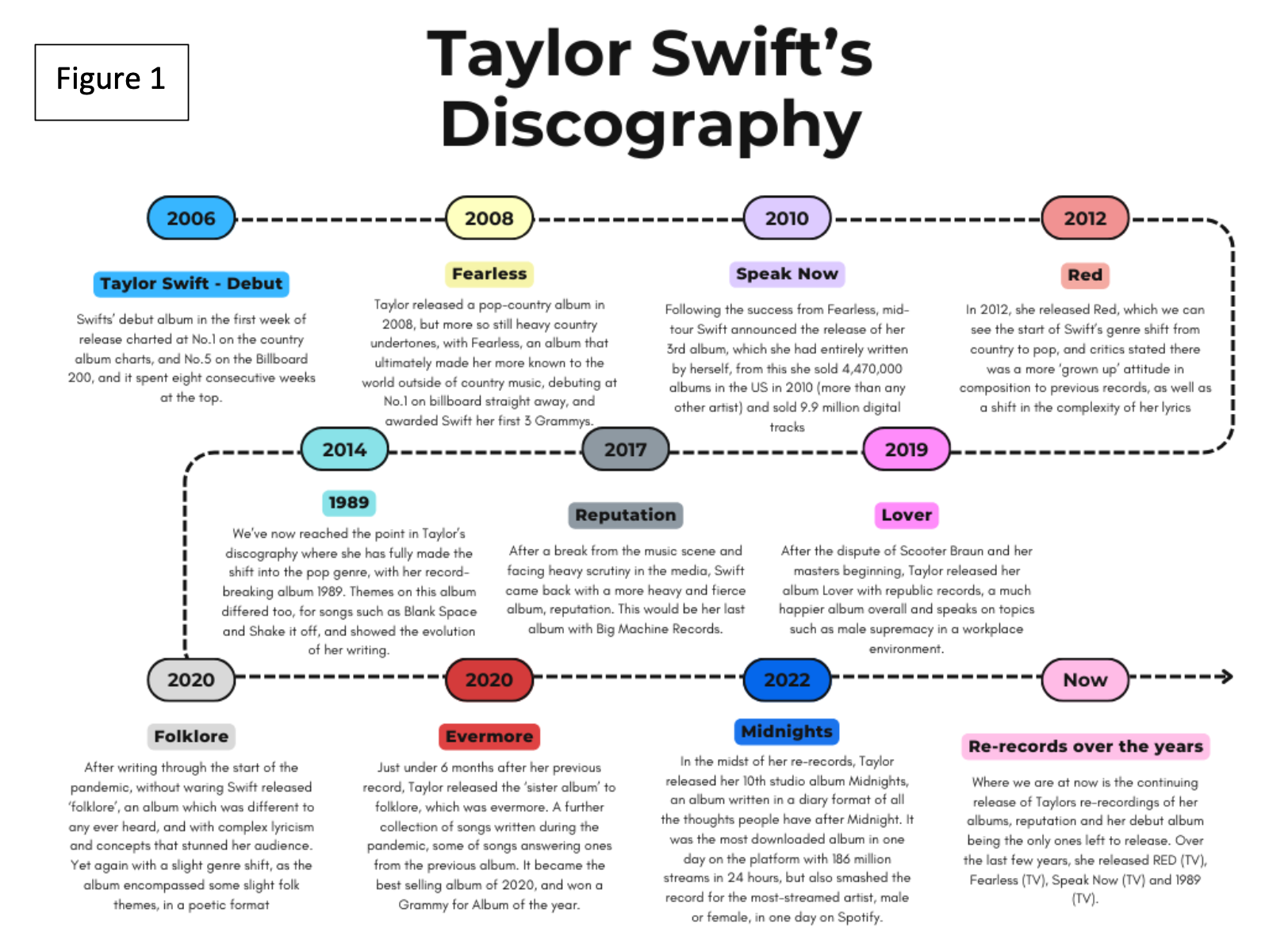
Moreover, the achievements and accomplishments that Taylor Swift has amassed in the 2- decade span of her career are nothing short of impressive. With an ever-growing awards collection, the American singer-songwriter has accumulated 12 Grammy Awards, 30 billboard music awards, 27 MTV music awards, 6 country music association awards, 32 American Music Awards, 2 brit awards, and broken 92 Guinness World Records (These are all as of January 2024) (Capital FM, 2024). Awards are not the only thing she has to show for her accomplishments, as the statistics prove it too, such as having more number 1 albums than any woman in history (Sisario, 2023) and as of March 2024 is the 3rd best-selling female artist of all-time, sitting behind icons Celine Dion and Madonna (ChartMasters, 2024).
The discography image demonstrates Swift’s back catalogue up to the date of January 2024. During this timeline there is a point in between the making of her original albums that alters the way in which Swift has worked, so far, in her career, and further addresses issues of ownership of her masters. This change of strategy began when Scott Borchetta sold Big Machine Records to Scooter Braun in 2019, and is the focus of the rest of this submission.
Chapter 2 – The Man, as experienced by Taylor Swift.
Taking it back to 2005 when Swift first signed her record deal with Big Machine Records, after being scouted by Scott Borchetta. The 13-year-long contract had various clauses that are fairly common amongst record labels, with nothing seeming too unusual in the early stages, especially not to a 15-year-old who just had her dream presented in front of her. Some aspects of the deal wrote that Taylor would receive a cash advance immediately, as long as Big Machine Records were to own the masters for her first 6 albums, which is not unheard of in the industry nor would it have presented itself as a concern, as it is often a way of the record label earning the money back which they had originally invested in the artist (Jasmine Zade, 2021). This allows the artist to make music videos, use their recording studios, hire mixing engineers, marketing and advertising paid for by the label, promotional material and more. By owning the masters of her first 6 albums, BMR would be able to earn back the money they spent investing in her from a young age, as well as further profiting from them. There are a multitude of different aspects to an artist’s rights to their music, and many ways in which these can overlap or catch artists out when signing their contracts.
As of 2017, in advance of the masters dispute, what Taylor herself owns and continues to own are the composition rights to her albums, which as explained in a blog written by The Institute of Contemporary Music Performance ‘The composition copyright protects the underlying song (the melody, lyrics and chord progression)’ (The Institute of Contemporary Music Performance, 2023). Additionally, as stated by the U.S Copyright Office, there are two types of copyright-protected works within music, the composition rights as mentioned above, falls under the rights of ‘A musical work’ which is a ‘… song’s underlying composition along with any accompanying lyrics. Musical works are usually created by a songwriter or composer.’ (U.S. Copyright Office, n.d.). Contrary to this, what Big Machine Records own as her label at the time which all Swift’s first 6 albums were recorded, is the master recording copyright, which as explained by Donald S. Passman, a master recording is ‘The original recording made in the studio … from which all copies are made from’, however the word ‘master’ in this sense has a dual meaning, as it can also be referring to ‘The master of one particular song, thus you might say an album has ten masters (meaning ten selections) on it.’ as explained again by Passman (Passman, 2003, pp.67–68). At the end of her 13-year- long contract with BMR, Taylor leaves the label and signs to Republic Records owned by Universal Music Group in November 2018.
Fast-forward to June 2019, it was announced by Taylor herself on Tumblr, as well as being headlines on various media outlets, that her music masters of her first 6 albums have been sold from Big Machine Records to Ithaca Holdings, which is a company founded and owned by Scooter Braun. Effectively meaning that Scott Borchetta sold Swift’s masters to Scooter Braun. In her statement on Tumblr, Taylor states that:
For years I asked, pleaded for a chance to own my work. Instead I was given an opportunity to sign back up to Big Machine Records and ‘earn’ one album back at a time, one for every new one I turned in. I walked away because I knew once I signed that contract, Scott Borchetta would sell the label, thereby selling me and my future. … Now Scooter has stripped me of my life’s work, that I wasn’t given an opportunity to buy. … This is my worst case scenario. This is what happens when you sign a deal at fifteen to someone for whom the term ‘loyalty’ is clearly just a contractual concept. … When I left my masters in Scott’s hands, I made peace with the fact that eventually he would sell them. Never in my worst nightmares did I imagine the buyer would be Scooter. … He knew what he was doing; they both did. Controlling a woman who didn’t want to be associated with them. In perpetuity. … Thankfully, I am now signed to a label that believes I should own anything I create. Thankfully, I left my past in Scott’s hands and not my future. And hopefully, young artists or kids with musical dreams will read this and learn about how to better protect themselves in a negotiation. You deserve to own the art you make. I will always be proud of my past work … Sad and grossed out, Taylor. (Swift, 2019).
The statement from Taylor’s perspective allows those outside of the industry to gain insight to the ongoing situation. A scenario which she alleges to have known nothing about, and is furthermore expressing the extreme levels of betrayal and raw emotion which she feels towards the sale of her masters to Scooter Braun. As quoted above, the American states that it had previously occurred to her about the possibility of her masters being sold and describes it as something she had ‘made peace with’, although this was clearly altered when finding out who her masters were sold to. This is likely due to a proceeding feud that was well known within the world of social media, between Braun and Swift. In parts of the statement Taylor explains why she feels victim to ‘incessant, manipulative bullying’ from Braun, one of these being that he was seen to be mocking her in facetime call with both his clients Kanye West and Justin Bieber (Swift,2019). This was after West had posted his music video ‘Famous’ without Swift’s permission, of him lying next to a wax figure imitating Swift naked, insinuating that sexual acts had occurred between the two, which Swift referred to as revenge porn (Kanye West, 2016). Knowing the context behind the singer’s dislike towards Braun, makes her disgust in her statement regarding the sale of her masters and who now owns them, more understandable.
Being in the spotlight to such an extent where at the time (2019) Swift had 114 million followers on Instagram alone, and with the statement being reposted on all platforms, the situation rapidly gained traction with the world eagerly awaiting a response from both Scott Borchetta and Scooter Braun. The response comes from Big Machine Records on the same day, a written statement from Borchetta stating elements with evidence (of which the accuracy behind is unknown) that Taylor was aware of the sale of her masters going ahead due to Borchetta supposedly having given her prior warning (Borchetta, 2019). It is worth mentioning that it was made public that Swift’s father, was a shareholder in Big Machine Records and was alleged by Borchetta to have known about the deal, but again this is information that cannot be confirmed or denied with accuracy. However, what it does state in Borchetta’s statement, is a text from Taylor in November 2018 in which she further expresses her disdain at the prospect of selling her masters but states ‘I had a choice whether to bet on my past or … my future … you can guess which one I chose’ and further expresses that she is intending on taking this scenario as a chance to educate younger artists and ‘effect positive change with the leverage she [I] has now’ (Borchetta, 2019).
The overall conclusions drawn from both statements, taking in what’s purely factual, allude to Swift being aware that Borchetta wanted to sell her masters as this is something they both can advocate for, but from this point facts are unclear, as Taylor states she wasn’t aware of who they were being sold to and ultimately that is where her anger lies at this point in the case.
Moving on to where the feud between the 3 (Scott and Scooter vs. Taylor) escalated further, we reach November 2019 where Swift is about to perform a medley of all her hits at the American Music Awards after winning artist of the decade, as well as releasing her upcoming documentary ‘Miss Americana’. It was posted by Taylor with a statement on social media proposing that Scott and Scooter told her she was forbidden from performing any of previous hits live as it could be seen as ‘re-recording’ the tracks before she was allowed to the following year, as well as being forbidden to include them in the upcoming Miss Americana documentary on Netflix. It was also reported by Taylor Swift that (Swift, 2019a):
Scott Borchetta told my team that they’ll allow me to use my music only if I do these things: If I agree to not re-record copycat versions of my songs next year (which is something I’m both legally allowed to do and looking forward to) and also told my team that I need to stop talking about him and Scooter Braun.
Big Machine Records came back to this denying all allegations, which then fuelled Tree Paine (Swift’s Publicist) bring forward email evidence in a now deleted twitter post, and the whole post (including the email) states (Resnikoff, 2019):
The truth is, on October 28, 2019 at 5:17 p.m. the Vice President, Rights Management and Business Affairs from Big Machine Label Group sent Taylor Swift’s team the following:
“‘Please be advised that BMLG will not agree to issue licenses for existing recordings or waivers of its re-recording restrictions in connection with these two projects:
The Netflix documentary and
The Alibaba ‘Double Eleven’ event’ [an event in China at which Swift performed last week].”
To avoid an argument over rights, Taylor performed three songs off her new album ‘Lover’ at the Double Eleven event as it was clear that Big Machine Label Group felt any televised performance of catalog songs violated her agreement.
In addition, yesterday Scott Borchetta, CEO and founder of Big Machine Label Group, flatly denied the request for both American Music Awards and Netflix. Please notice in Big Machine’s statement, they never actually deny either claim Taylor said last night in her post.
Lastly, Big Machine is trying to deflect and make this about money by saying she owes them but, an independent, professional auditor has determined that Big Machine owes Taylor $7.9 million dollars of unpaid royalties over several years.
Having been exposed by Swift’s publicist, Taylor was allowed to go ahead and perform her medley of hits as desired and it remains to be one of her most impactful performances yet, as Taylor used it as a platform to portray the dedication and desperation she holds to regain control over her masters.
In December 2019 the battle of the Scott’s Vs Swift only continues, when Taylor wins Women of the Decade at Billboard’s Women in Music Awards, and during her 15-minute acceptance speech, the singer shares more insight and clarification on the current situation regarding her masters and the sale of her catalogue. Proceeding to say that the ‘unregulated world of private equity coming in and buying up our music as if it’s real estate’ is a ‘potential harmful force in our industry’, which can be assumed to be directly aimed at Braun and the sale of her masters to Ithaca. The matter of which is further confirmed when she speaks on her own experience stating (Billboard, 2019).:
This just happened to me without my approval, consultation, or consent. After I was denied the chance to purchase my music outright, my entire catalogue was sold to Scooter Braun’s Ithaca Holdings in a deal that I’m told was funded by the Soros Family, 23 Capital, and the Carlyle Group. Yet to this day none of these investors have ever bothered to contact me or my team directly to perform their due diligence on their investment. On their investment in me. To ask how I might feel about the new owner of my art.
Swift further goes on to also applaud those who have reached out to her and ‘had her back’, specifically the women in the music industry and the way in which she believes the ‘toxic male privilege’ in the industry had an impact on those who did not come forward to support her (Billboard, 2019).
Moving to November 2020, an update posted by Taylor via Instagram and X (formerly known as Twitter), states that her catalogue previously acquired by Braun, had now been bought by a private equity company known as Shamrock Holdings Ltd., which at the time of writing in April 2024, still has ownership of the masters for her first 6 albums and the antecedent music videos along with them. In the statement, Swift comments that:
For the past year I’ve been actively trying to regain ownership of my master recordings. With that goal in mind, my team attempted to enter into negotiations with Scooter Braun. Scooter’s team wanted me to sign an ironclad NDA stating I would never say another word about Scooter Braun unless it was positive, before we could even look at the financial records of BMLG (which is always the first step in a purchase of this nature) (Swift, 2020).
She further goes on to state remarks made her legal team, saying that this was ‘absolutely not normal’ and that they’d ‘never seen an NDA like this presented unless it was to silence an assault accuser by paying them off’. In the statement, it alleges that Braun wasn’t doing as little as quoting a price to Taylor’s team, which if this is to be true, it makes it quite clear that they never intended to allow Swift to buy back her catalogue. Continuing on in the post, the American singer explains that her team received a letter from Shamrock a few weeks previous, alerting her of the sale (which had already gone through), and that the company had intended of reaching out to her before the sale, but Braun had required that they make no contact with Swift or her team, otherwise the sale would not go through. She states that ‘I learned under their terms Scooter Braun will continue to profit off my old musical catalogue for many years. I was hopeful and open to the possibility of a partnership with Shamrock, but Scooter’s participation’. The sale which went through from Braun to Shamrock, was $300 Million, not including the money the Ithaca Holdings CEO would continue to receive when profiting off her music after the sale. To avoid any claims or accusations of false information being spread, Taylor further included the letter of response which she sent to those at Shamrock (Swift, 2020) (See Figure 2).
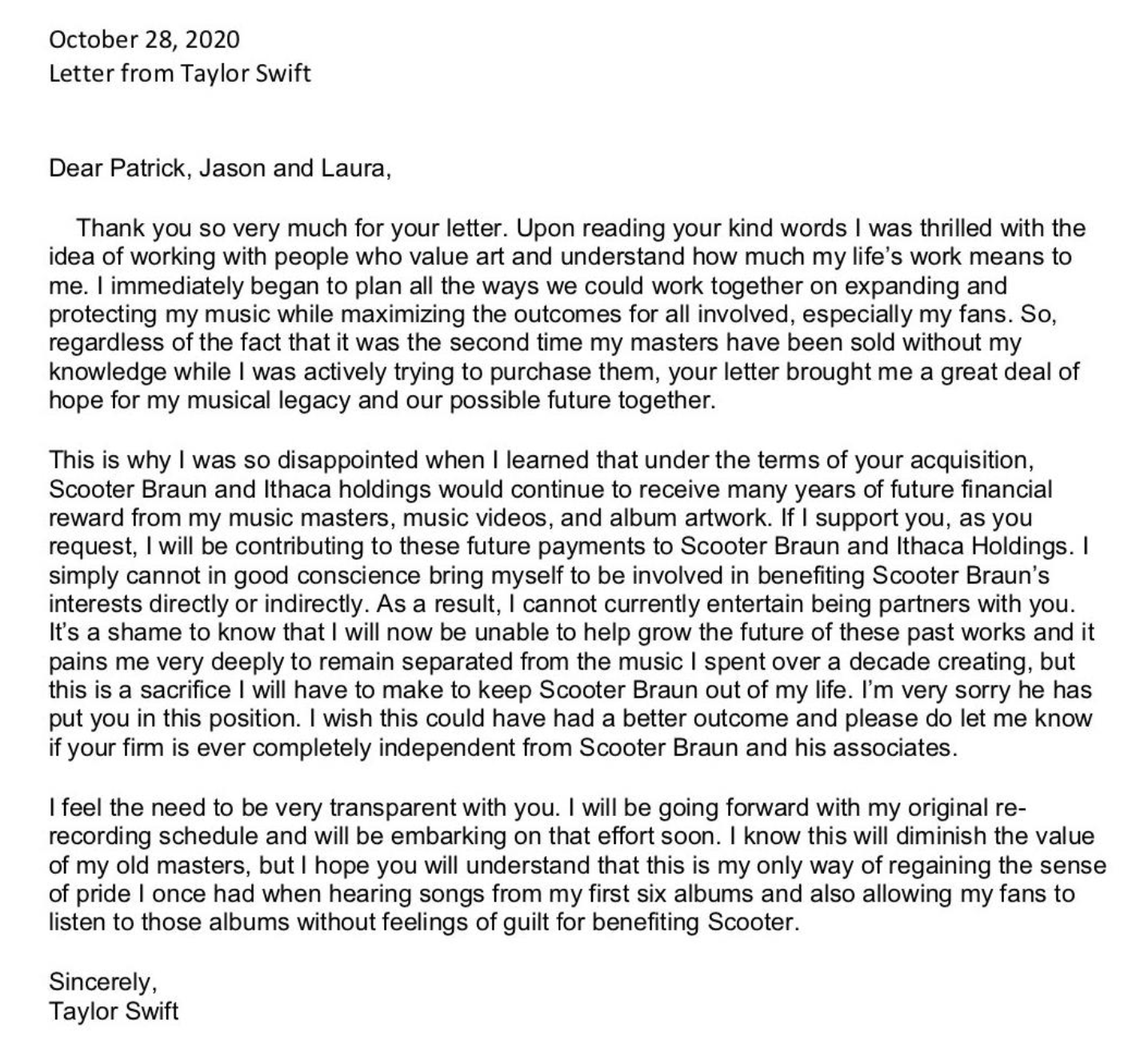
However, a positive announcement made from Taylor at this point was that she was already in the process of re-recording her first six albums. It’s worth mentioning, that experiences of misogyny and sexism in the industry, whilst being a cautionary topic, is a theme extremely apparent throughout the course of Swift’s career and even further presented throughout the battle for ownership of her masters. The use of power and authority by both Scooter Braun and Scott Borchetta in an attempt to dethrone and belittle Taylor whilst she tries to regain the rights to music she wrote, as a young female artist in a male dominating industry, is a frightening case to witness, especially for aspiring females trying to make their way in the industry. In a report, written by the Musicians Union, specifically covering themes of misogyny and sexism as faced by females in the UK Music Industry, members of the MU of which there are over 32,000, as stated in their report, 80 members responded to a survey and ‘over 90% of respondents said they have experienced misogyny and/or sexism whilst working in the music industry’ (Musicians Union, 2022).
Making references in her own songs, such as The Man, off her ‘Lover’ album which was written after the masters dispute, Swift explains her own experience in a male dominated industry and how the reaction could’ve differed had she have been a man, in lyrics such as ‘They’d say I hustled, put in the work, they wouldn’t shake their heads and question how much of this I deserve [if she was a man]’ (Swift, 2019b). Using the situation of her fighting for her masters, it seems clear now that Taylor may have overcome the power-hungry fight for domination and control in the music industry, which is proved even further by the success of her re-recorded albums.
Chapter 3 – Begin Again (Taylor’s Version)
Following on from the masters dispute, Swift was eager to start over and begin recording her records again, although before delving into the infamous Taylor’s Version albums it’s best to explain the legalities as to why she is having to do this in the first place. In the music industry, each song will have various legal rights attached to them and various people who the rights belong to. As explained earlier, Taylor currently owns the composition rights to her first 6 albums, in contrast to this, the recording rights which protect the audio recordings of the songs and the masters, were bought by Scooter Braun, and are now owned by Shamrock Holdings Ltd (Passman, 2003, pp.67–68). To regain her master recordings, the American singer-songwriter began re-recording her first 6 albums immediately, an example I created which shows the differences in rights as of May 2024 can be seen in figure 3. As far as the public is aware there has been no direct order in which the albums have been re-recorded and released, as they haven’t been released in the original order. As of April 2024, the public have 4 out of the first 6 albums released as Taylor’s Version, although through various media speculation and hints dropped by Taylor herself it is believed ‘Reputation’ will be the next re-recorded album to be published (Prance, 2024).
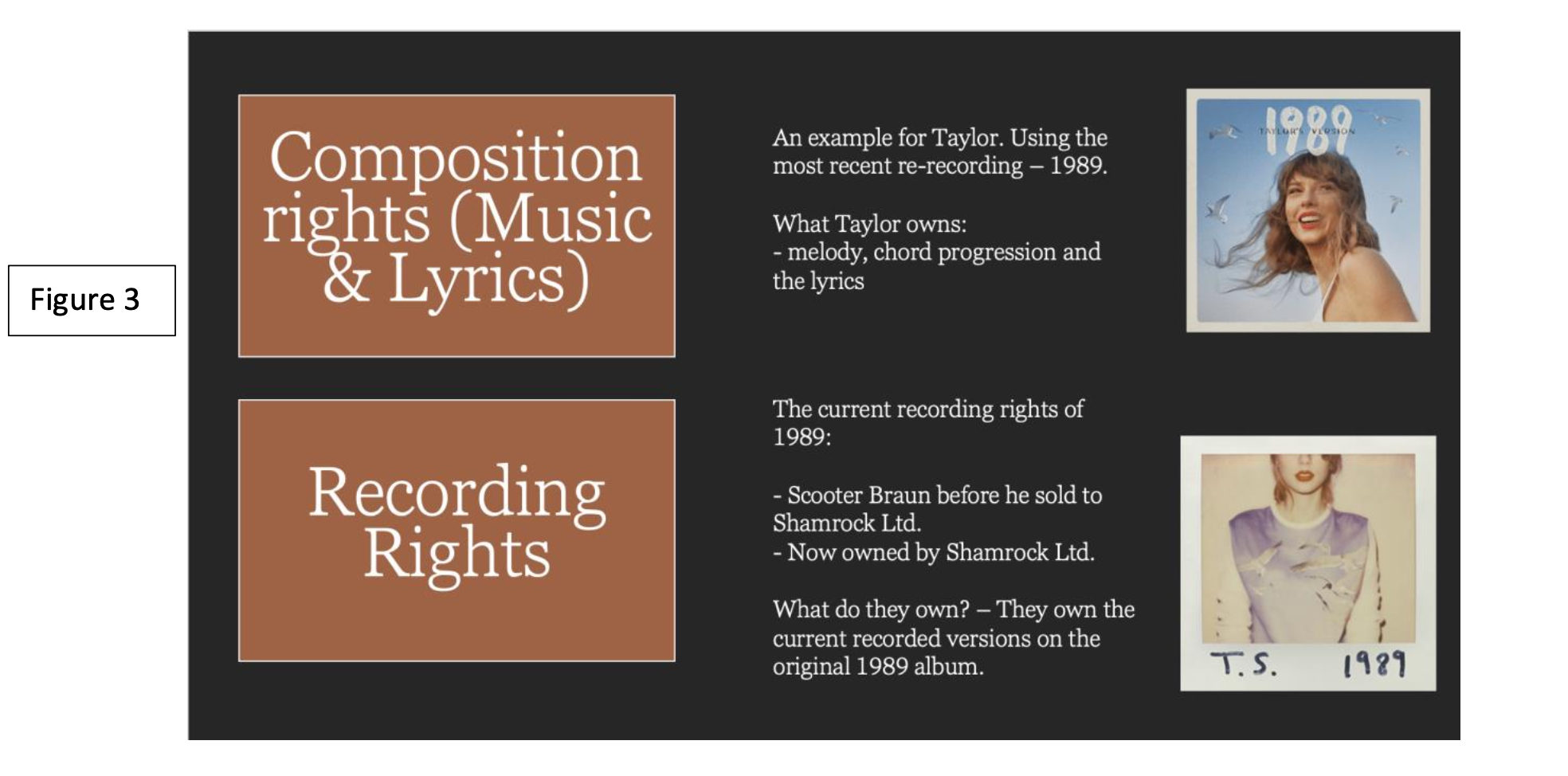
The re-records
As explained by Taylor Swift in 2021 when being interviewed on ‘Late Night with Seth Myers’:
I’ve always wanted to own my own music since I started making my music, you probably don’t know this but most of your favourite artist’s do not own their work. … I made it very clear years ago that I wanted the opportunity to buy my music, that opportunity was not given to me and it was sold to someone else, so I figured I was the one who made this music first, I can just make it again.
Reminding the world of the situation regarding the sale of her masters, and explaining why she feels the desire to re-record them, proceeding further into detail as to why the albums are named ‘Album Name (Taylor’s Version)’, saying (Late Night with Seth Myers and YouTube, 2021):
When something says (‘Taylor’s Version’) next to it, that means I own it, which is exciting … it’s also interesting to go back and relive this nostalgia with fans, who are the reason why I get to do this … I get to do things that I know they (the fans) wish I’d done the first time.
When announcing the name (Taylor’s Version), Swift further announced the inclusion of ‘vault tracks’ into each album, which are unreleased tracks originally written for the first release of the albums, meaning that the newer, re-recorded albums, would include songs no one has ever heard. The first ‘Taylor’s Version’ album to be released was ‘Fearless (Taylor’s Version)’, in April 2021 with the inclusion of 6 vault tracks and gained 50 million global first- day streams on Spotify (Shafer, 2021), and with this coming a few months after the release of Swift’s chart-topping pandemic albums, Fearless TV allowed Swift to be awarded with being the first ever female artist to have three number one albums in less than a year (Caulfield, 2021), and in the UK allowed her to overtake the record originally set by The Beatles to claim the fastest accumulation of three number one albums (Copsey, 2021). Following on from the success of Fearless TV, as a one-off early release, Taylor released ‘Wildest Dreams (Taylor’s Version)’ from her album 1989 in September 2021, as the song was going viral on TikTok at the time, due to the amount of streams and airtime the song was receiving she wanted to be getting the credit and royalties, and rightfully so, hence the early release.
The re-records, whilst being personally beneficial, also sky-rocketed Swift’s career in allowing her to break countless records and win numerous awards. An element of the newer albums which went viral, amassing 6.67million streams on it’s first day of release on Spotify, was All Too Well (10 Minute Version) from Taylor’s 2nd re-recorded album RED (Pop Base, 2021). When released in November 2021, the pop/country album graced fans with some newer content, other than the vault tracks. Taylor decided to take one of her already popular and cherished songs, and include a 10-minute, extended version of the original track written in 2012. All Too Well (10-Minute Version) also was made into a short film, directed by Swift herself, starring actors Dylan O’Brien and Sadie Sink. The extended song, amassed countless awards and did wonders for Swift’s career considering it was still very early in the process of her re-recorded albums. One of the awards won was breaking the Guinness world record for being the longest song to reach number 1 on the billboard 100 (Pilastro, 2021), as well as winning a Grammy Award for best music video (Weatherby, 2023) and 3 MTV music video awards (IMDb, 2023). In total, the song itself and short film won 14 awards alone, not counting the 6 other awards win RED (Taylor’s Version) also won (Taylor Swift Wiki, 2021).
Moving forwards, as of April 2024, Taylor has released 4 out of 6 of the albums which she decided to re-record to regain ownership of the masters, in order of release, the 4/6 which she owns are: Fearless (Taylor’s Version) (April 2021), RED (Taylor’s Version) (November 2021), Speak Now (Taylor’s Version) (July 2023) and 1989 (Taylor’s Version) (October 2023).
Primary Research conducted regarding re-records.
To gain insight on the public reaction to the more recent versions of Swift’s work, I conducted a survey made specifically for fans of Taylor’s music asking them how much they know about the masters dispute, what the new records mean in terms of ownership, and in- depth questions about whether they currently prefer Taylor’s Version or the original albums. I considered that this may change per album, so also asked them to decide between Taylor’s Version and the originals for each of the 4 re-recorded albums. The survey was sent out to a Taylor Swift fan group on Facebook, as well as personal friends who are fans of Swift and the survey received 45 responses in total. The statistics from the responses show a clear appreciation for Taylor’s Versions’ of the albums, although there are some differences when it comes to the individual albums. The nature of these responses are valid and provide room for discussion, although due to the survey having been filled out by only Taylor Swift fans, there is a risk of bias.





Based off the figures as seen above, 98% of listeners make a conscious decision to listen to Taylor’s Version, over the older albums, and following this up with the 96% of listeners who are aware of the ownership differences, it is a valid assumption that they choose to listen to Taylor’s Version over the originals due to these being the records that Taylor owns and fans will feel a level of empathy towards this. As seen in figures 5, 6 and 7, there is a difference in opinion amongst fans regarding personal preferences between the original albums and re- records. 33% of fans admitted they listen to the originals instead of Taylor’s Version and this is further analysed per album, which as seen in figure 6, 1989 is the album which has the largest number of listens to the original in comparison to the other 3. In spite of that, it is clear that Taylor’s version overall is more listened to in comparison to the originals, with 78% of listeners still choosing this over the albums owned by Shamrock Holdings Ltd., proving the success and benefit re-recording the albums has had (Shaw, 2024).
The Eras Tour
Given the success Swift gained following the release of some of her re-recorded albums and popularity after being in the headlines regarding her masters dispute, she decided to begin her worldwide tour in 2023 named ‘The Eras Tour’. A tour which would go on to break countless records, and as it stands is ongoing until December 2024 after an astonishing 152 shows across 5 continents. The Eras Tour consists of each show being 3 and a half hours long from the moment Swift steps on stage, and is separated into 11 different eras, one for each album she’s released, with over 40 songs each night and 16 different costume changes and more (O’Sullivan, 2023). An aspect that draws the fans in is that, unlike other concerts where they will have a specific setlist and each show is essentially the same each night, Taylor’s show, whilst having a setlist, has the inclusion of ‘surprise songs’ which is two different songs each night picked from her entire discography, so no matter what date you’ve been to, as a fan each person will have had their own unique experience. The worldwide tour could be argued to be a result of Swift’s masters dispute, since she is using the time to tour the 6 albums of which the masters were stolen, as well as 4 that were yet to be performed (Hilton, 2023). Otherwise, it could’ve just been a regular tour for a new album, and whilst the re-records, Eras tour and The Eras Tour live film (released in October 2023) all benefited her personally, they were also insanely clever marketing moves, and the world was beginning to realise the mastermind that is Taylor Swift.
Using a situation that others would view as career-destroying, it became career-enhancing for Swift. The inclusion of vault tracks, especially with featured artists, brought more people to listen to her version of the albums, as well as new listeners who are fans of the featured artist. Additionally, The Eras Tour was where Braun and Borchetta likely faced their largest loss and regret, as of March 2024 the tour had already broken 13 records, one of these being world’s first ever billion-dollar tour as of December 2023, which is before the 34-year- old has even made her way to the UK and Europe (Viswanath, 2024). The tour was so successful in the US, that the singer was credited by The Federal Reserve for her impact on boosting the US economy, The Common Institute states ‘The totality of Taylor Swifts’ U.S. tour could generate $4.6 billion in total consumer spending, larger than the GDP of 35 countries’ (Fox, 2023).
Chapter 4 – What can we learn from Swift and her monumental shift in the music industry?
With the facts and dispute outlined above, there is a lot that future, current and past musicians can be educated on and various strategies, approaches, and methods to put into practice to make situations like this preventable, or solvable should they occur. This is not the first time a dispute between an artist and their label and/or managers regarding rights has happened, Sir Paul McCartney has previously found himself in a lawsuit amidst fighting for the rights of The Beatles catalogue, a battle that started in 2008 and only finished when McCartney sued Sony/ATV in 2017. Sony publishing had the rights to over 200+ songs from The Beatles catalogue, after Michael Jackson bought it in 1985 for ATV in a $47.5 million deal, and then ATV merged with Sony in 1995, meaning it was a 50/50 share between Sony and Jackson, although Sony negotiated a deal with Jackson for them to own 75% of the catalogue (Rys, 2017).
In 2016, Sony then bought Jackson’s percentage in the company for $750 million, making them the sole owner of the Lennon-McCartney catalogue, causing McCartney to file the official lawsuit, but in 2017, Sir Paul McCartney and Sony/ATV Publishing resolved the matter by entering a confidential settlement agreement, as stated by The Guardian (France-Presse, 2017). Now in this instance, McCartney couldn’t go through the process of re-recording the albums like Swift has, due to being one of two surviving members of the band left, which is where it is clear Swift’s solution won’t always be the way to solve situations like this. If you are found to be in a dispute like McCartney and Swift, if it isn’t something that can be resolved through private discussions like Swift attempted, and since re-recording everything is a unique and rare occurrence, the likelihood is that you will enter a legal battle, but large parts of it will revert back to the original contract signed by the artist in which its likely to state something in terms of ownership of rights.
As stated in chapter 1, Swift signed a 13-year-long contract to Big Machine Records, and in instances where you’re a young artist signing to your first label, it is not uncommon for some clauses in the contract to state that the label will own your masters, in-fact it’s incredibly rare for this not to happen. Although, this is where the exploitation of young artists becomes a point of discussion, which has been seen countless times, with female artists such as Miley Cyrus or young boybands like One Direction, in which the person/persons will be exploited by using their dreams to be musicians against them. By allowing them to enter iron-clad contracts for long periods of time, years or even decades, it restricts them to hitting the peak of their careers whilst under their control, meaning the label will be the owners of their biggest hits. To avoid this and taking some notes from Swift’s successful career, artists ought to try to refrain from signing contractual agreements that are longer than 4-5 years, because whilst you may gain the opportunity to renew the contract, you could also be signing your masters away in perpetuity as explained by Kwame Safo, which essentially means forever (Safo, 2022). Make sure to be aware of the difference between recording rights and composition rights, and who within your team owns them, and if it’s not you, find out when they would become available to you or negotiate a clause that allows for this.
From a more positive perspective, the whole industry can learn from Swift’s positivity surrounding the dispute, and the skills she portrayed as a businesswoman to make her significantly more successful post the sale of her masters, in comparison to her fame before. The industry can learn to not underestimate, exploit or misjudge women in the music, or artists who joined from a young age, because it is clear from the success rates of people like Swift, Miley Cyrus, Harry Styles (of One Direction) and many more that it’s likely the comeback of the artist post-exploitation will be stronger than their entry into the industry.
Conclusion
The cultural impact which Taylor Swift has had on the music industry is phenomenal and paves the way for future artists. The 34-year-old has mastered the art of taking control of her rights and showed that they can be won back, but also demonstrated to artists the importance of knowing your rights and knowing how to regain them. The American has further portrayed marketing and sales strategies that can allow you to gain the most profit from your work, such as the inclusion of vault tracks, releasing countless different formats of LPs’ in which each one has something slightly different, whether that be new cover art or a hidden track but she has completed the art of getting the best fan engagement and bridged the gap between parasocial relationships, by consistently acknowledging her career is nothing without them (the fans). Furthermore, she has been one of few who has managed to tackle ticket-selling scams, by partnering with Ticketmaster’s verified fan programme, making fans register in advance for an opportunity to buy tickets, and giving out the majority of presale codes to people who have legitimately bought music from her website, and whilst it hasn’t solved the issue of ticket scammers, it’s reassuring to see an artist like Taylor attempting to find ways to resolve it.
Overall, Taylor Swift’s battle for ownership, whilst it may have been a painful process in the beginning, has benefitted the singer tremendously. The solution which she has taken has allowed her to become TIME’s person of the year in 2023 (Lansky, 2023), and is currently crowned world’s number 1 recording artist (Richter, 2024), and as of May 2024 is ranked the 12th greatest artist of all time (ChartMasters, 2024a).
